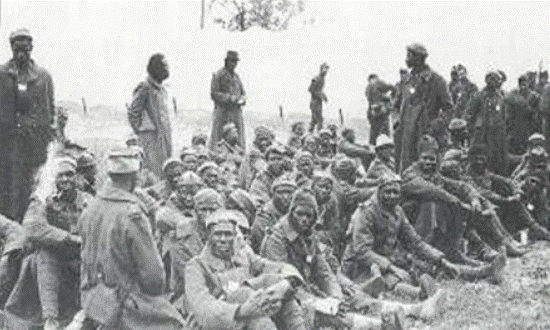Senegal: Eighty Years after the French Colonial Massacre of Soldiers

France has long been accused of falsifying or hiding records, and accounts of the number of casualties have remained unclear.
Senegal has commemorated the 80th anniversary of a colonial-era massacre of African soldiers who fought for France during World War II and were shot by French soldiers in 1944 for demanding fair treatment and payment on their return.
It was supposed to be their last stop before home, awaiting financial compensation for years of service, fighting for France in the war, and being detained in Nazi-run camps for years. However, instead of receiving what they deserved, more than 500 rounds of ammunition fired the soldiers within 15 seconds, according to archives consulted by Martin Mourre, a French historian, who calls the incident the execution of unarmed soldiers.
Reports by the French military shortly after the massacre determined that 35 West African soldiers were killed, while other reports by the French army mentioned 70 deaths. However, many French and Senegalese historians have recently agreed that the real death toll was likely in the hundreds, with possibly almost 400 African soldiers killed, based on estimates of the number of riflemen present at the camp on the day of the massacre.
The West African country has long demanded its former colonizer take responsibility, officially apologize and properly investigate the massacre. France has long been accused of falsifying or hiding records, and accounts of the number of casualties have remained unclear. The 202 graves at Thiaroye cemetery are anonymous and it is not known how many are victims of the 1944 killings.
The controversies and unknowns about the massacre are in part due to a lack of transparency by French authorities regarding the military reports and testimonies. France has long maintained that it had given access to all its archives on the killings, but cracks in that assertion have begun to appear. For the 70th anniversary of the killings in 2014, the president then, François Hollande, said the death toll was more likely 70 — double the toll France had previously acknowledged, but still far below historians’ estimates.
As president Faye emphasized, it was important to pay tribute to the dead soldiers of 1944 “and establish a new relationship with ourselves, our history and the descendants of the perpetrators of this tragedy”. President Faye said in his interview with Le Monde, only truth would help Senegal and France move toward a partnership “ridden of painful remnants.” He also called on hundreds of French troops still in Senegal to leave.
The commemoration comes as France, faced with growing opposition to its military presence in several African countries, losing its sway in its former West African colonies. French troops have been ousted in recent years from Niger, Mali, and Burkina Faso. Meanwhile, Chad, one of the last countries in the region where France had maintained a large military presence, ended a military cooperation agreement with Paris.
References
www.africanews.com/2024/12/01/senegal-demands-answers-as-it-remembers-a-french-colonial-massacre/
www.france24.com/en/africa/20241201-senegal-demands-truth-80-years-french-colonial-massacre-thiaroye-france
www.aljazeera.com/news/2024/12/1/senegal-seeks-answers-80-years-after-french-colonial-massacre-of-soldiers
www.nytimes.com/2024/12/01/world/africa/france-senegal-thiaroye-massacre.html

